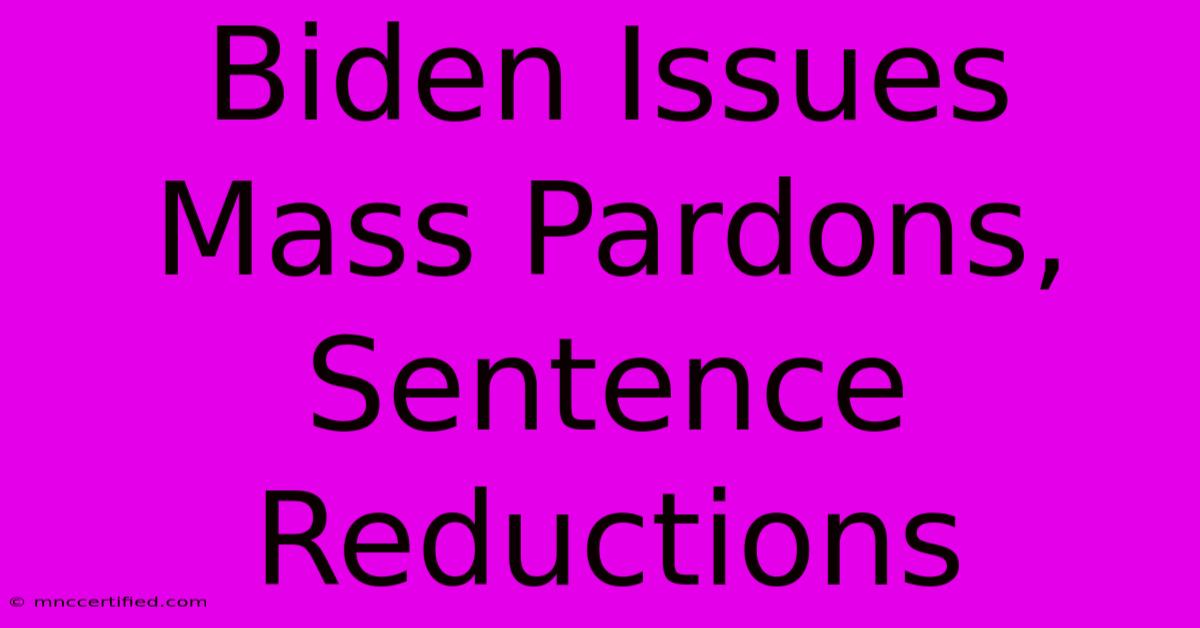Biden Issues Mass Pardons, Sentence Reductions

Table of Contents
Biden Issues Mass Pardons, Sentence Reductions: A Deep Dive into the Impact
President Biden's recent announcement regarding mass pardons and sentence commutations has sparked significant debate and analysis. This article delves into the details of this significant action, examining its potential impact on individuals, the justice system, and American society. We'll explore the specific criteria used, the potential challenges, and the broader implications of this sweeping policy change.
Understanding the Scope of the Pardons and Commutations
President Biden's initiative focuses on individuals convicted of simple marijuana possession under federal law. This represents a landmark shift in federal drug policy, acknowledging the disproportionate impact of marijuana prohibition on marginalized communities. The pardons eliminate the criminal record for these offenses, offering a crucial second chance. Importantly, this action does not affect state-level convictions for marijuana possession; those still fall under individual state laws.
The sentence commutations extend beyond simple possession, encompassing individuals serving time for drug offenses who meet specific criteria, including good conduct during their incarceration. This facet aims to address the harsh sentencing guidelines of past decades, recognizing that they often led to excessively long prison terms, particularly affecting minority populations.
Key Criteria for Pardon Eligibility:
- Federal conviction for simple marijuana possession: This is the core requirement for receiving a pardon.
- No other prior felony convictions: Individuals with serious criminal histories are excluded to ensure the pardon's focus remains on those who made a relatively minor offense.
- US citizenship: Only US citizens are eligible for the presidential pardon.
Challenges and Potential Obstacles:
While this initiative is lauded by many, potential challenges exist. The sheer volume of applications expected could overwhelm the system. Furthermore, the impact on state-level convictions, which remain unaffected, needs careful consideration. The potential for bureaucratic bottlenecks and inconsistencies in processing the applications is also a concern. Legal experts are already analyzing the potential for legal challenges to the process.
The Broader Impact: Social Justice and Systemic Reform
The Biden administration frames this action as a step toward addressing racial and social justice inequities embedded within the US justice system. Historically, marijuana arrests disproportionately affected minority communities, even when usage rates were comparable across demographics. By offering pardons and commutations, the administration aims to mitigate the long-term consequences of these discriminatory practices, including obstacles to employment, housing, and education.
This initiative serves as a powerful symbol of reform, prompting a broader conversation about sentencing disparities and the war on drugs. It raises questions about the effectiveness of harsh sentencing guidelines and the need for alternative approaches to drug-related crime. It also sparks discussions around broader criminal justice reform and the need for systemic changes to address underlying social and economic inequalities.
Long-Term Implications:
The long-term implications of this policy shift are significant. It could influence future drug policy debates, potentially leading to further decriminalization or legalization efforts at both the state and federal levels. The pardon and commutation initiative could also serve as a model for other administrations, setting a precedent for addressing past injustices within the criminal justice system. The data on recidivism rates amongst those who receive pardons will be crucial in evaluating the long-term success of the program.
SEO Considerations and Keyword Optimization:
This article incorporates relevant keywords organically throughout the text, including:
- Biden pardons
- Biden commutations
- marijuana pardons
- federal drug policy
- criminal justice reform
- mass pardons
- sentence reductions
- social justice
- racial justice
This approach aims to improve search engine optimization (SEO) while maintaining natural language flow. Further off-page optimization would involve promoting the article on social media, linking to it from other relevant websites, and building high-quality backlinks. Regularly updating the article with new information and relevant data will also ensure its continued relevance and ranking potential.

Thank you for visiting our website wich cover about Biden Issues Mass Pardons, Sentence Reductions. We hope the information provided has been useful to you. Feel free to contact us if you have any questions or need further assistance. See you next time and dont miss to bookmark.
Featured Posts
-
Glasgows 11 In New Scotland Squad
Dec 13, 2024
-
The Game Awards 2024 Highlights
Dec 13, 2024
-
Arrest Made James Kennedy Domestic Issue
Dec 13, 2024
-
Unveiling The Witcher 4 Early Footage
Dec 13, 2024
-
Metas 1 M Donation To Trump Inaugural Fund
Dec 13, 2024